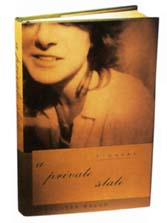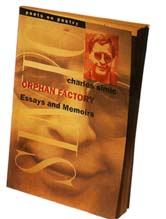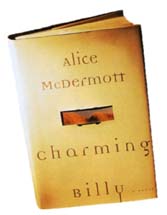 |
 |
| current issue |  |
past issues |  |
send a letter/news |  |
address update |  |
advertise |  |
about us |  |
alumni home |
| Fall 1998 |

|
| Departments |

|
| Alumni News |
| Short Features |
| Book Reviews |
| Campus Currents |
| Class Notes |
| Features |
| History Page |
| Obituaries |
| President's Column |
| Guest Column |
| University Research |

|
| Department Archives |
| Table of Contents |
|
Search UNH Magazine: |
Cover to Cover
|
Books by UNH faculty and alumni by Anne Downey '95G |
Easy to print version |
A Private State: Stories , By Charlotte Bacon, University of Massachusetts Press, 1998
Orphan Factory: Essays and Memoirs , By Charles Simic, University of Michigan Press, 1997
Charming Billy , By Alice McDermott '78, Farrar, Straus and Giroux, 1998
A Private State: Stories
See at amazon.com

In Charlotte Bacon's story, "Safe as Houses," the main character, Elizabeth, a genealogist who is learning about settling into a new home, thinks that "she understood working in pieces from her experience with genealogy, with its hunt for links and separations, its attempts at the neat articulation of relations, so tactile but evasive." Elizabeth might also be describing Bacon's project in A Private State, a sharp and brilliant collection of stories that capture the moment-to-moment coming-together and falling away of relationships.
In her first book, Bacon, a new English department faculty member, tells eleven stories that center on girls and women, ranging from age ten to the brink of old age, and on transforming experiences: a haircut in "Arizona," a dog lost and found in "Luck," a whale sighting in "Pacific." Like an abstract painter, she seizes the exact detail that allows the reader to imagine an entire environment or relationship--in "Luck" for example, "the manager gave Lillian a glance as if trying to assess the likelihood of a bond between someone with a haircut like Kris's and a woman with a handbag like Lillian's" --and she is amazingly adept at describing emotional extravagance with language that is spare, sentences that are taut.
Again in "Luck," Lillian greets her corgi, lost from their Connecticut home and found in Colorado: "'Who took you?' He started to squirm. 'Why did you go with them?' She shifted him into her arms and buried her face into his ears. Not a trace of someone else's perfume, strange food, an unfamiliar city. He must have spent a long time in a car, staring at a blur of New York, Ohio, Kansas. 'Why did you go?' she asked him again, taking his snout in her hand. 'Were you trying to come home?' He screwed up his eyes and sneezed. She put him back on the floor. In the kitchen, he circled his blanket three times and settled into twitchy sleep." The stories and characters will linger long after you have closed the book and passionately pressed it into a friend's eager hands.
Orphan Factory: Essays and Memoirs
See at amazon.com

I. In his essay on "Poets's Notebooks," English professor Charles Simic writes, "my father used to remind us children often that his life's biggest regret was that he never had anything to write with whenever a terrific idea struck him. He expected us to sigh along with him for the great loss to humanity this represented; instead, we just laughed until he got mad and left the dinner table. As it happens, years later his son walks around with pockets containing not one but several writing implements and notebooks."
Lucky for us, the poet emptied his pockets and the result is Orphan Factory, an engaging collection of journal entries, autobiographical essays, criticism and prose poetry. There is so much to ponder, to savor in these reminiscences, these philosophies: musings on poetry, art, religion, war, insomnia, humor, the immigrant experience in America, and the poet's own family. For example, there's the sweet hilarity of "Dinner at Uncle Boris's": "[Boris] studied opera singing for years, tried to make a career of it, and failed. Now he sings only when he's happy. He has a huge, beautiful tenor voice, but no ear. When he starts hitting the high notes, you have to run for your life. It's no use. He can be heard across the street. He has the world's loudest voice and it's off key. He sings for us an aria from Otello. We survive that somehow, but he's not through yet. We are going to hear Tristan's death scene. Across the table my father looks grim. My brother has vanished. I am lying on the floor at Tristan's feet trying my best to keep a straight face."
And, as always in Simic's work, there is the pleasure of listening to one of America's best poets talk about the relevance of poetry, as in "Poetry and Experience": "Perhaps only in poetry the bedrock reality and the singularity and the mystery of an individual human life is grasped. Poems witness our existence in ways nothing else can. There's that moment in a great poem when time stops and the reader's self is touched by someone else's life. The poem ascends, and so do we in its company. In a long history of forgetting, poems make us remember what it means to stand naked before ourselves."
Charming Billy
See at amazon.com

There are three reasons to read Alice McDermott's fiction. First is her amazing ability to capture a particular community, whether it be a neighborhood, as in her remarkable second novel, That Night (1987), or an Irish Catholic family, as in her 1992 At Weddings and Wakes, and this wonderful new novel. Hear, for instance, Billy Lynch's (the charming Billy of the title) cousin, Dan, talk about Alcoholics Anonymous: "'I remember Billy saying that AA was a Protestant thing, when you came right down to it. Started by a bunch of Protestants. He said he didn't like the chummy way some of them were always calling Our Lord by his first name. I drove him to the first meeting and waited to take him home, 'cause Maeve didn't want him driving, and when he came out he said you could tell who the Catholics were because they'd all been bowing their heads every ten seconds while the Protestants bantered on about Jesus, Jesus, Jesus.' (And sure enough, up and down our stretch of table, heads bobbed at the name."
Second is her skill at knitting a narrative with skeins of past and present. McDermott has made her mark in American fiction by writing about how the past determines the present, how our stories about the past are more than legacies: they are truths we tell ourselves every day, and they shape who we are. In Charming Billy, McDermott's narrator, Billy's cousin Dennis's daughter, discovers this as she unpacks the central event that the novel turns on: Billy's long-ago love affair with an Irish girl, Eva, who supposedly died of pneumonia before Billy could marry her. The narrator watches and listens as Billy's relatives try to explain the story of Billy's unrequited love, and she ultimately realizes that they are relating their own ideas about love, about loss.
She imagines her father making sense of Billy's passion for Eva: "Although, in truth, he saw: indistinctly as yet and as if from the corner of his eye. Think of those ruined, ragged men in the street, Billy among them, in the unimaginable future. . . . With so many other forces at work in the world, brutal, sly, deceiving, unstoppable forces, what could be more foolish than staking your life on an ephemeral feeling, no more than an idea, really, a fancy, the culmination of which is a clumsy bit of nakedness, a few minutes of animal grunting and bumping, a momentary obliteration of thought, of conscience? Indistinctly, and as if from the corner of his eye, he saw what Billy's fine dream, Billy's faith, was going to come to. But he also saw, in his own (his own father's) romantic heart, that its consummation would become a small redemption for them all." McDermott's keen eye for detail--truly nothing escapes this writer--and her tender attention to matters of the heart transform this story about one family into a story about all families. Which is the third reason why you should read her fiction.
Anne Downey received her Ph.D. in English from UNH and currently teachers in the English department and the Women's Studies Program. She wwrites on a wide range of subjects and is the book reviewer for Ex Libris, the newsletter for the New Hampshire Writers Project.